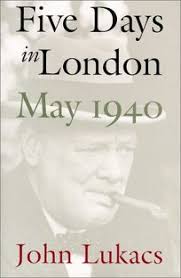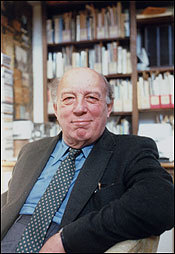The momentous five days are May 24 to May 28 1940 when Winston Churchill became Prime Minister and overcame the resistance to his leadership within the War Cabinet and stiffened British resolve to resist Hitler and Naziism.

In so doing Churchill felt the pulse of the British people far more accurately than his many opponents, most gathered behind him in the Conservative Party. British resistance at the time of Dunkirk prevented Hitler from winning the war so that later American gold and Soviet corpses would win it.
These two paragraphs above sum up this book, the nature of which will be discussed at the end.
The story is without parallel. At age sixty-five Churchill became PM in the deepest crisis ever for Great Britain. His energy and concentration alone are noteworthy. His hour had come and he lived up to it. He was certainly the Greatest Britain.
First to the internal resistance. When Neville Chamberlain, over seventy himself stepped aside, after tumultuous scenes in parliament, he remained in the five-man War Cabinet, literally there was no one else at the starting line but Churchill. As PM he alone, it seemed, could restore order to Parliament which was elected in 1935 in far different circumstances. And many in the Conservative Party thought it best to let him try …. and fail, and then the real heir apparent could sweep up and take over. That was Edward Halifax (who had so many names and titles I gave up trying to keep track of them).
An aristocrat to the core, Halifax could not push himself forward but would wait to be called. He was, after all, a personal friend of the King, and a vastly experienced parliamentarian, diplomat, cosmopolitan, and more.
Why no one thought of calling new elections is not considered in this text.
As darkness grew with the fall of the Netherlands, the surrender of Belgium, the defeat in Norway, the collapse of France, the entry of Italy on Hitler’s side, the neutrality of the United States, Spanish troop movements near Gibraltar, the aggressive noise of Japan in Asia, the reluctance of Canada, many Brits wanted a truce with Germany.
While the British Expeditionary Force flailed, Churchill spent five days out-manoeuvring Halifax, Foreign Secretary in the War Cabinet, who kept on about a truce, a pause, an arrangement with Germany, brokered by France, by Belgium, by Italy, by the Duchy of Grand Fenwick. On and on he went in the super secret discussions, which remained secret at the time. According to the author, efforts were made subsequently by weeding archives to bury the secrets.
Halifax minced words, explored semantics, twisted meanings to find a way to open a mediated dialogue with Nazi Germany, anything to avoid another blood bath like World War I. He talked repeatedly with the Italian ambassador until Italy invaded France. He sought out informal intermediaries. He lunched with the King.
If there were a way to stop the war and guarantee Britain’s freedom by making concessions to the Naziis, Halifax wanted to discuss it. While nothing concrete remains on paper such an arrangement would involve leaving Europe to Nazi domination. Period. It might also involve emasculating Britain sufficiently so as not to pose a threat in the future to German domination of Europe by reducing the British fleet, by forcing it to withdraw from the Mediterranean and sacrifice Malta, Gibraltar, even Suez. Further it might involve disarmament, as it did for Vichy France in a few weeks. Would it also involve compliance with Nazi racial policies….starting with sending back refugees.
Churchill took the view from the start, albeit muted, that there was no point in trying to negotiate with Hitler. Either Hitler would propose impossible demands, or, if not, he would not keep his word. In either case for it to be known that Britain had begged for a separate peace on such terms would destroy British morale on the domestic front and comprise British standing on the international front with the Dominions and the United States.
The author makes a tenuous distinction between public opinion and popular sentiment in the era. The former, public opinion, was formed by the intellectual classes in newspaper articles, letters to the editor, lectures, universities, BBC interviews, essays, and the like. The opinion leaders were fearful of Germany’s might and had little confidence in Britain’s ability to withstand it. As a consequence many in these ranks were Defeatist to one degree or another. Some were admirers of Hitler. A small number wore the black shirt of Sir Oswald Ernald Mosley, 6th Baronet of Ancoats (16 November 1896 – 3 December 1980).
Popular sentiment in contrast was the silent majority of the day, largely working class, generally uneducated and unaware of the wider world, although a great many had served in World War I and the author seems to forget that. The author makes extensive use of reports from the Mass Observation Survey, begun in 1935, as a window on to this stratum. These reports were qualitative surveys of doorstop interviews, pub conversations, overheard remarks on buses, talk in queues at the market, or discussions exiting cinemas. Unsystematic to be sure, but rich in detail. Yes, that is true but it is also true they were a lot more like gossip than systematic observations in the specimens I have read.
Popular sentiment was resolutely patriotic with none of the weakening cosmopolitanism of the intellectual classes. Germans were the Hun, not the progeny of Brahams, Beethoven, and Bach. It also had a rugged confidence in muddling through and took pride in that. They had once crossed the Siegfried Line and could do it again. This was the heart beat that Churchill felt, because he shared it, and which he mobilised.
While it is not emphasised Churchill’s mastery of the forms of British parliamentary democracy and cabinet government gave him an advantage. He timed meetings of the cabinet of thirty where he had many supporters, War Cabinet where he had none, parliament, BBC speeches, and personal meetings to create support and momentum for his commitment to war, war, and more war, and so to undermine Halifax’s position. In part his publicity campaign was to show to the United States and the Dominions that Britain would prevail.
While Dunkirk is mentioned, it is not the focus. In the foreground is the tactical conflict between Churchill and Halifax across the meeting table against the backdrop of the war. War Cabinet met two or three times a day.
For Halifax what was a stake in the war was the future of Britain. For Churchill what was at stake was Western Civilisation. It seems laughable to a jaded intellect today to say that, but that was both Churchill’s rhetoric and his perception. Naziism was a ravening and devouring beast that could not be caged, tamed, constrained, or reduced by negotiation and treaties. Even to try to treat with it was to become corrupted by its touch in one’s own eyes and in the eyes of the world. To plead with this beast from a position of weakness was suicidal. In a few weeks the French example would prove that point.
While Halifax evidently thought negotiation, even if it failed would enhance rather than diminish Britain’s claim to the moral high ground. It would show that Britain had done everything possible to avoid war. That almost makes sense, until considering the sacrifices that would have to be offered or made to a Nazi dominated Europe and Mediterranean. The willingness to bargain away the defeated countries (some of which had formal alliances with Britain, many of whose fleeing citizens had taken refuge in England) and those that might follow would never be forgotten nor forgiven.
He also differed from Halifax and his ilk in another way. He saw Naziism as the greatest evil and threat to Western Civilisation. Whereas Halifax and his kind feared Communism above all else, and many had earlier seen in Naziism a bulwark against the Red Tide, as earlier had many German nationalist, liberals, monarchists, bankers, musicians, and jurists who supported or tolerated Hitler at the outset.
The comparison has to be France, where nothing was ever secret and where the disputes within cabinet were blood thirsty. Every remark in cabinet was in the boulevard press within the hour. The conflicts between cabinet members were personal, religious, regional, and racial as well as ideological. Finally, the French generals gave up before the politicians. They were ready to surrender before Paul Reynaud, the last Prime Minister. Indeed Reynaud resigned rather than surrender.
Three things then distinguished Britain, secrecy, impersonal argument, and military resolve.
 John Lukacs has a long list of impressive publications.
John Lukacs has a long list of impressive publications.
The book does not do the events justice. It treats Dunkirk and the decision-making about that as an annoyance to the cabinet machinations rather than central to it. It is replete with asides and ruminations that lead no where. Much of it is parsed in the negative, e.g., ‘he was not entirely wrong,’ ‘there is some truth in this matter,’ and so on. A manuscript like this submitted blind to a publisher today would be unlikely to be produced. ‘While the references to the Mass Observation reports are interesting, it is not convincing unless one is already convinced and then it confirms.’ That would be one of the many things an anonymous assessor might say.
I read it years ago and did not find it satisfactory but recent stimulation about Dunkirk brought it back to mind and I tried it again with the same result.
Skip to content
